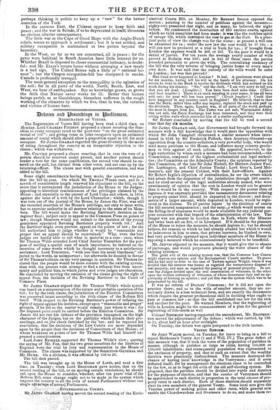Glancing abroad in the interval of leisure, we see that
the hori- zon presents the same appearances of tranquillity as at home. France is friendly ; and has just concluded a postage-treaty with this country, giving to both new conveniences of intercommunica- tion, and affording a promise of further measures of mutual advantage. There is no revolution, nor even emeute, in France ; none in Spain, nor in Portugal or Switzerland—at least that we know of at present. The North is quiet : for discontent in Prus- sia is as yet theoretical rather than practical. In the East, Russia still holds the Servian question hanging over the head of Turkey ; perhaps thinking it politic to keep up a "raw" for the better coercion of the Turk.
In the extreme East, the Chinese appear to keep faith a• ad peace ; and the war in Scinde, if to be deprecated in itself, threatens no obvious ulterior consequences.
The little war at the Cape of Good Hope with the Anglo-Dutch rebels, seems to approach a settlement ; but it is not settled, and military occupation is maintained at two points beyond the boundary.
In the West, so far as we are concerned, all is peace ; for the petty wars habitual in South America have little interest for us. Whether Brazil is disposed to closer commercial intimacy, is doubt- ful; and Mr. ams's return home without arranging a new treaty is a bad sign. The United States talk a little of " national ho- nour "; but the Oregon occupation-bill has dissipated in smoke. Canada is profoundly tranquil.
The most general exception to the tranquillity is the agitation of the soil ; for in all parts of the world, North, South, East, and West, we hear of earthquakes. But as knowledge grows, so grows the faith that Nature never works for ill. Better that human beings perish, as at Guadeloupe, blameless sufferers in the rough working of the elements by which we live, than in war, the votaries and victims of human hate.



















































